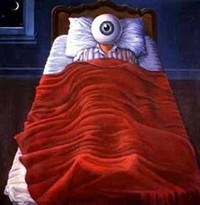How to Overcome a Lucid Dreaming Dry Spell

There is just one prerequisite for becoming an intrepid dream explorer - and that's an abundance of lucid dreams.
But what if you're having a lucid dreaming dry spell?
This affects nearly all of us lucid dreamers at some point or another. It can be terribly frustrating to experience - especially if the idea bothers you for weeks or months on end.
Ironically, the more you yearn for your next moment of lucidity, the more elusive it becomes... and before you know it, your lack of confidence in your ability to become lucid can indeed turn into a self-fulfilling prophecy.
But this is not to do with ability. We are all natural-born lucid dreamers, even if most of us leave this skill untapped our whole lives.
The issues are motivation, time and know-how. Since you already know how to lucid dream, let's take a closer look at the issues of motivation - or lack thereof - and setting aside the time to lucid dream.
Common Causes of Lucid Dreaming Dry Spells
I believe that identifying the cause of your situation is the best way to resolve the problem. So try to identify the practical cause of your lucid scarcity from the following. You may even find there is more than a single factor at play...
Newbie Explorers
Problem - Beginner lucid dreamers can expect a general lack of lucidity in the first few months. Lucid dreaming is still so new to your situation, that nearly all of your dreams are non-lucid, and it is still a challenge to lift the mental fog.
I'm hesitant to even call this a "dry spell" because actually, it's totally normal to experience little or no lucidity given your history. But once we've tasted lucidity we only want more - and this quickly leads to frustration when more lucid dreams aren't forthcoming. So I'd like to offer some ideas for hurrying along your next conscious dream...
Solution - For such a broad problem, the solution is equally broad, and requires a good deal of conscious effort. You are still in training and, just how a beginner piano player can't immediately master Rachmaninoff, there is much for you to learn and ingrain before you can experience frequent lucidity.
Your goal is to automate lucidity; like the pianist develops muscle memory, so too must you learn to automatically trigger lucidity while you sleep. Check that you aren't making any of these rookie mistakes and work on increasing your general waking lucidity during the day by enhancing your self-awareness.
I recommend mastering frequent (and meaningful) reality checks; becoming familiar with nightly meditation and guided visualization; and doing dream incubation - Mnemonic Induction of Lucid Dreams (MILD) serves us well.
Practice your lucid dreaming techniques on a daily basis and try to identify the best combination that works for you. Don't get worked up about achieving a Wake Induced Lucid Dream (WILD) or Out of Body Exit, which are exciting prospects but notoriously difficult to succeed at in the early days. (I would only recommend these methods from the outset if you suffer from sleep paralysis and intend to use it as a stepping stone to lucid dreams.)
If you continue to practice the right techniques, regularly and with skill, and aren't having any more lucid dreams, then there's another block. Try posting about your problem in our forums or Ask The Experts for specific advice.
Sleep Deprivation

Problem - Sometimes, life gets too hectic and you can't find the time to get enough sleep to nourish your waking life... let alone your dreaming life.
In the majority of cases, sleep deprivation is a direct negative effect of a busy modern lifestyle. The most common culprit is the dreaded alarm clock; in my experience waking up to an alarm is one of the worst lucidity thieves. They snatch the final hours of REM-packed sleep we might otherwise enjoy.
Other causes of sleep deprivation are shift work, jet lag, crying babies and insomnia to name a few. It's not as if we choose to live this way - it just happens. And though a sleepless zombie may well glean the odd lucid dream during times of REM rebound, in the big picture it really hurts your lucid dreaming efforts. So what can you do?
Solution - The obvious solution is easy to say - yet extremely difficult to implement: simply, sleep more. The more you sleep, the more dream time you rack up and the more opportunities you have to become lucid. In addition, since REM stages are prolonged in the second half of the night, by sleeping just an hour or two extra, you can drastically increase your overall REM time.
If sleeping continuously for an eight-hour period is simply impossible in your current lifestyle, consider this alternative.
Polyphasic sleep means breaking your daily sleep into three or more separate blocks. It is common in many animals and is thought to be the ancestral sleep state for mammals (although, normally simians are monophasic). This napping approach is recommended as a last resort by the US military and the Italian Air Force, who even found that "total sleep time was substantially reduced as compared to the usual 7–8 hour monophasic nocturnal sleep".
Steve Pavlina, a lucid dreamer who blogged online about his own polyphasic sleep experiments in 2005, aimed to enter REM sleep within a single 20-minute nap. (Normally it takes about 90 minutes to hit REM in monophasic sleep.) After adapting to his new sleep routine, he reported extremely vivid, long-lasting dreams and increased mental clarity upon waking.
After having a baby, I encountered a polyphasic sleep pattern myself, albeit unwittingly. Overnight, I went from enjoying 9-10 hours sleep with no alarm clock, to just 2-4 hours sleep per night during the early months of motherhood. I was desperately tired, forgetful, emotional and mentally foggy - even after napping during the day to catch up. I did indeed experience lots of vivid dreams, a number of them lucid, although I can't say anything for mental clarity.
There were probably too many confounding variables in my post-natal state to report the true effects of polyphasic sleep. Having survived through this mind-boggling level of sleep deprivation and back, the idea of a polyphasic sleep experiment is actually quite appealing to me now. (For a start, I reckon I'd get a lot more done in a day.)

If that all sounds too extreme for you, then consider taking a closer look at your lifestyle and the cause of your sleep deprivation. If you can get to bed an hour earlier each night, it might just be enough to set your lucid dream life free.
Lucid Waking
Problem - You don't have sufficient self-awareness while awake in order to recognize when you're dreaming. Put another way: would you expect the pianist to perform well if he never audialized nor listened to music?
Solution - The idea of being "lucid while awake" is quite simple - we are not redefining the notion of lucid dreaming. In essence, it is important to reflect upon the nature of reality while awake if you intend to reflect upon the nature of reality while dreaming. This is the ultimate trigger of lucidity.
So, the greater your waking level of self-awareness, the greater your dreaming level of self-awareness. There are many ways to improve your self-awareness - from the simple to the sublime. A quick example (more at the link above):

Take any object (say, a glass of water) and imagine the impossible. With your eyes open and looking directly at the glass, visualize it melting into the table. Now imagine it shattering as if spontaneously fractured by a high pitched sound. Imagine it levitating and floating an inch up in the air. Now imagine the water coloring itself with a deep red dye.
There are countless ways to imagine the glass of water changing in unlikely or impossible ways. Imagining them happening while awake is a type of reality check. All these sorts of surreal events happen in dreams and by imagining them and analyzing them in reality, we trigger a level of awareness that causes us to ask the question: "This can't be real - am I dreaming?"
This exercise provides a training ground for us to stop sleepwalking through our days, study and observe our reality, and question whether it is real or not. When you determine your world isn't real, you become lucid!
Lucid Incubation
Problem - You don't give lucid dreaming a moment's thought all day long, then have an urgent need to dream lucidly when your head hits the pillow.
Solution - An extension of the previous problem, forgetting to incubate a lucid dream - or do any kind of lucidity preparation at all - is a sure-fire way to experience a night of dull, non-lucid dreams.
The solution is have lucid dreaming on the brain. Start by writing in your dream journal first thing in the morning. Spend 10-15 minutes recording your dreams (lucid or non-lucid) in as much detail as possible as per these dream journal guidelines. This will supercharge your dream recall for starters.
How else can you cement your intention to have lucid dreams?
I do this by writing a website about it. You could write about your dreams in our lucid dream forum or indeed start a personal (if anonymous) blog.
I also read books about lucid dreaming and find this triggers even more lucid dreams when I read before bed. There are lots of quality books on lucid dreaming worth keeping by your bedside. A good author can reignite your passion for lucidity; indeed, that is one goal of this website.
Another way to motivate your lucid dream life is to daydream and fantasize about your next lucid dream. Inject those elements which inspire you most - whether it is of a creative, sexual or intellectual nature.
None of these incubation methods require any special skills or knowledge, making them easy to implement. Simply lay down your desire to lucid dream, as often as feels natural, throughout the waking day so it becomes a familiar notion.
Final Thoughts
If you are stuck in the middle of a lucid dreaming dry spell right now, take comfort from the fact that it happens to the best of us.
We just need to take a step back, understand the cause and act on that. Reigniting your lucid dream life can be as simple as reading a book, indulging in a daydream, or whispering to your unconscious as you drift to sleep:
"I will lucid dream tonight."

















